

We, the Westpark Gamers, found that we increasingly play brand-new games shortly after they have been published, with the goal of quickly bringing competent reviews/session reports/strategy tips to the web-surfing public. By-and-by we realized that there were always "faves" among these new games, games that are worth to be raised above the increasing number of reviews on our site. Therefore it seemed logical to create this monthly award, which should be seen as a personal and subjective recommendation by the "Westpark Gamers". With this award we would like to make the friends of our website aware of games that we think stood out in our monthly menu of games.
Gaming is a matter of taste - we can only give our personal opinion as gaming gourmets. Have fun with it!
| Month | Game | Description | Links | |
|---|---|---|---|---|
| March 2009 |
|
Martin Wallace remains a powerhouse of game design. His more recent games have nearly all been economically themed, "Steel Driver" belongs to this series of games. If the task would have been "Create a game that includes all the principles of 1830 but plays fluidly and under 1 1/2 hours with lots of depth" then Wallace would have reached this goal with flying colours. It is rare that a relatively simple game creates so much content with relatively little rules - a thoroughly recommendeable game - not only for train fans! "It is impossible not to be thrilled by (Edgar) Wallace"... |
Luding | |
| February 2009 |
|
Not all abstract games have to be boring or tedious (we have to admit that many aren't). "Uptown" by Kory Heath is a shining example here, as it combines elegance of rules with a good gameplay, depth and a friendly (short) game length. W. Eric Martin from "boardgamenews.com" originally introduced us to this game during his visit in Munich, and it was a quick hit with the group back then. Now the German version is out, and there is a reason to crown this game our "GAME OF THE MONTH". As a quick tile-laying game with satisfying decisions and high fun-factor it is definitely recommended! |
Luding | |
| December 2008 |
|
Sankt Petersburg: "New Society and Banquet Expansion" A simple expansion of a game does normally not qualify as our "Game of the Month". But this expansion of "Sankt Petersburg" is an ingenious combination of new game elements and adapted rules, which does not only preserves the excellent mechanisms of the basic version, but improves the overall gaming quality, suspense and players' interaction. We can now play this game of all games from the year 2004 also in rounds of five. For us this is as good as a new game. |
Boardgamegeek | |
| November 2008 |
Winsome, 2007 (Wabash Cannonball) |
A railroad game of the "1830 light" kind! We buy shares of railroad companies, build track between cities and pocket dividends for the operation. We practice in peaceful co-operation, aim at the best income, and try to furnish our lines with a maximum of liquidity and minimal expenditure. A beautiful game for investors and engineers that can be played within 90 minutes, which is a third of the time required for a "normal" 18xx game. A game however, which is in its surprises and refinement by no means inferior to its big brothers. |
Boardgamegeek | |
| August 2008 |
|
Martin Wallace is one of the most renowned game authors of today - his new game "Tinners' Trail" has an unusual theme that doesn't hint at an exciting game (or does anybody dream of being a tin surveyor who sells home-made pastries on the side?), but this couldn't be farther from the truth. The mechanics are much simpler than in Wallace`s other games (like "Brass" or "Pericles"), but this actually helps to make the game instantly accessible while players always have interesting decisions to make. Especially interesting is the innovative turn order mechanic that hasn't been seen in games yet. A great game! |
Luding
Westpark Gamers |
|
| July 2008 |
|
Brass is no easy game to get into - some of the mechanics are quite unique and the first game might be full of mistakes. But after a while a new dimension in Wallace's work can be discovered. His recent games give the players more control over their actions but also are more of a challenge even for experienced gamers. Like a clockwork the various mechanics interlock to create a rather abstract but highly satisfying gaming experience. One of the most interesting games of recent months, but you should have your brain equipped to play it! |
Luding | |
| April 2008 |
|
It seemed only right to elect "Stone Age" as our game of the month after our good Walter has created an extensive analysis of the game's statistical pitfalls. Again "Michael Tummelhofer" has managed to create a fascinating game with lasting appeal, in which each decision must be well contemplated. In contrast to "St. Petersburg" this game has an easier learning curve because of the self-explanatory theme, and it is also more forgiving. The resource dice bring a relaxed moment to the game, which is also beautifully produced. |
Luding
Westpark Gamers |
|
| March 2008 |
|
Ystari Games continues to amaze with their new abstract placing game with twists. Metropolys might have the least attractive map of all Ystari Games, but its clever "bidding" mechanic works very well and creates many brainteasing situations for the players. A rather silent "Thinking Man's" game, but not outstaying, it is welcome with a 30-60 minute game length. This can be especially recommended for anyone who liked the mood of Ystari's first game, "Ys". |
Luding
Westpark Gamers |
|
| January 2008 |
|
In "Agricola" the players are farmers and try to create a florishing enterprise. They have to keep their farming, expansion of farmhouses and fiels, their cattle-breeding and family extension in balance to secure nutrition for all. Each player tries to select the best development move in a constantly changing game situation. They have to take into account a large variety of constraints, which make every game a new challenge. Agricultural engineers discover an inexhaustible realm of activities in which they can endulge for a whole gamer’s life. |
Luding
Boardgamegeek Westpark Gamers |
|
| December 2007 |
|
"In The Year Of The Dragon" is a new resource management type game that falls into the category "shortage games". From the beginning on players are under pressure to fulfill various demands that become increasingly difficult. The event track (which is randomly assigned) is the heart of the game, the players know already, what hardships they have to endure, but even the best plans can be laid to wreck by the other players. A great game that easily fascinates! |
Luding
Boardgamegeek Westpark Gamers |
|
| November 2007 |
|
Czech Games Edition has had a strong international line-up in the last year. With "Galaxy Trucker" they have created their most original game so far - innovative to the core it has players build their own spaceships and then send them on a dangerous journey through the galaxy. When comets slowly tear the ships to pieces and pirates lurk behind the next planetoid fun is to be had galore. A thoroughly recommendable game and one of the most interesting games of 2007. |
Luding
Boardgamegeek Westpark Gamers |
|
| October 2007 |
|
In the category "quick closer game" this new Friedemann Friese opus can garner many points. It is a "cat in the sack" that we like to play again and again, as it is fast, furious and still very simple to explain. |
Luding
Boardgamegeek Westpark Gamers |
|
| August 2007 | 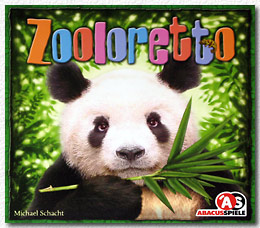
Abacus Spiele, 2007 |
Quite belatedly we chose "Zooloretto" - now "Spiel des Jahres" - as our "Game of the Month". "Zooloretto" is a typical candidate for the award, as it is thematically broad enough to appeal to a wide audience of all ages, but still giving enough food for thought for the more serious gamer. The boardgame elements enhance its predecessor "Coloretto" (already a successful game in its own right). We would probably chose the new version over the old one now, though. A good new entry into the honourable list of "Spiel des Jahres" games list has been selected. |
Luding
Boardgamegeek Westpark Gamers |
|
| June 2007 | 
Ystari, 2007 |
Successful boardgame-to-cardgame conversions have been surprisingly common these days, and Caylus - Magna Carta is no exception. It could even be stated that this game is actually better than its already fantastic predecessor. Caylus - Magna Carta plays faster and more streamlined than the original game, but offers the same tactical and meaningful decisions while being gripping to the end. Very recommended! |
Luding
Boardgamegeek |
|
| May 2007 | 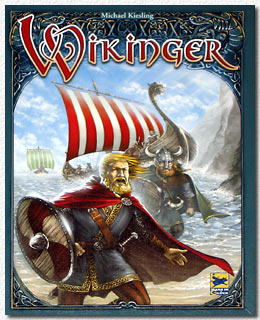
Hans im Glück, 2007 |
Players compete in building a Viking empire. Piece by piece they expand their insular scenery and populate their islands with warriors, scouts, nobles, peers, goldsmiths and fishermen. They earn money and victory points, they defend against Viking attacks and they supply the population with the necessary food. Most amazing is the novel mechanism how to buy the island tiles: easy to understand but difficult to describe. In each round twelve tiles are laid out in a certain order. Their prices rise from 0 to 11 units, and on start the higher places are almost prohibitively expensive. But according to well-defined rules they get cheaper and cheaper and every player has a remarkable influence on this decline. Everything mates very well. Every player waits with eagerness for his next move. The brilliant game idea has been conceived by Michael Kiesling and Hans-im-Glück has proven with it his reputation as an excellent games publisher. |
Luding
Boardgamegeek |
|
| April 2007 | 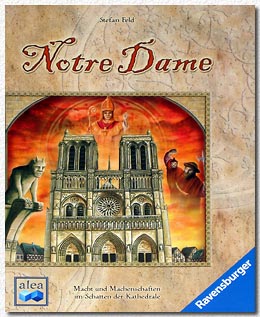
Alea, 2007 |
Notre Dame puts players - as our Guenther has put it - immediately under high "starving" pressure when managing their pawns. No matter what you do, one has always "too little" to do it: too few actions, too little money, too few pawns and usually way too many rats. It is rare that a game puts such high pressure on the players right from the first round, without being mean or unjust at the same time. Of course this is a typical German abstract Euro game, but its designer has devised so many clever playing mechanics that we were immediately taken by it. High marks by the Westpark Gamers! |
Luding
Boardgamegeek |
|
| February 2007 | 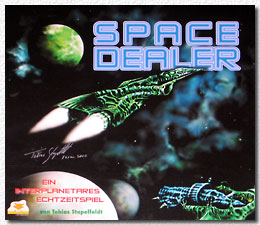
Eggert Spiele, 2006 |
It is very rare that innovations appear in boardgaming, so Space Dealer has to be applauded simply for trying something really new and making a good job out of it. A "real time" game in which all players act simultaneously has been attempted often and often it hasn't worked (memories of the atrocious "Time Agent" anyone?). But here a good solid Eurogame design, which takes heavy influence from computer resource management games, really does the job very well, and Eggert Spiele has to be applauded for the constant rise in quality that they have kept up in the last years. This game is absolutely unlike any other game you've played, so give it a try! |
Luding
Boardgamegeek |
|
| December 2006 | 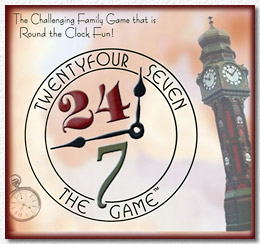
Sunriver Games, 2006 |
24-7 the Game is a great light game of number tile scoring, a bit reminiscent of but much better than Zatre (which plays much slower). Sunriver Games has again managed to produce a winner! Very recommended for all kinds of gaming groups. Rules: bilingual (German and English), can be explained in 2 minutes Game material: impeccably good Game length: 20 minutes, and you want to play again immediately |
Luding
Boardgamegeek WPG review |
|
| November 2006 | 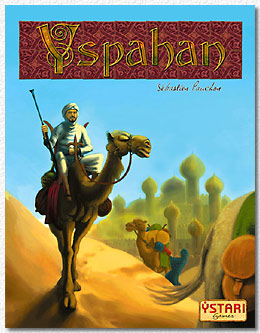
Kosmos, 2006 |
It's not often that the Westpark Gamers vote a game of the month in complete unison, but here it was like this. Yspahan is a game that has us all in its grasp: Günther and Walter immediately started to construct complicated probability tables, the others simply want to play it again and again. Even though it's a dice game its die mechanic itself is a blast, and the various decision trees make life difficult for the player. Several roads lead to victory, but none of them is completely calculable. Luck is the spice of the game, not its dominating factor. In short: a fantastic game, that easily outmatches the already classic Ystari games of late in the fun department. |
Luding
Boardgamegeek WPG review Dicing probabilities |
|
| Oktober 2006 | 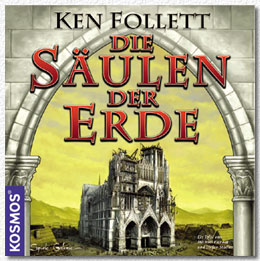
Kosmos, 2006 |
An excellent offering that comes as a surprise when looks at the very few succesful book/film tie-ins that are out there (and especially Kosmos' speckled history in that respect). In fact the game mostly avoids a close representation of the book, which mostly is some flair text on the cards (and there is very little flair text). This is simply a very delightful and challenging game for gamers, with more than a passing resemblance to Caylus but with some aspects that make the game actually more accessible and even more forgiving. The different phases work very beautifully together, there is no downtime as all phases are interactive and the game also doesn't overstay it's welcome but is engrossing up to the end. The fancy turn counter (the cathedral IS the turn-counter, in case you wondered) made Richard Borg laugh so hard that he nearly fell out of the chair, when he watched our game. And it was a hearty laugh if there ever was one! But seriously - if you like involved but not too heavy games with lots of beautiful bits and pieces you should clearly consider purchasing this wonderful game. It was one of the very rare cases that a German company produced game was actually completely sold out at Essen, even though it was available in great numbers originally. Very recommended! |
Luding
Boardgamegeek WPG review |
|
| September 2006 | 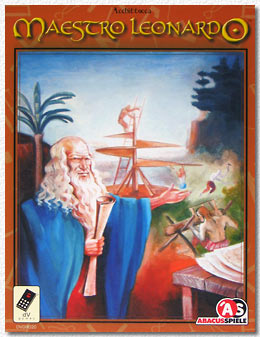
Abacus Spiele, 2006 |
The title sounds like art, but the content is pure commerce, however of the finest kind. The players develop crafts shops, acquire raw materials for their production, recruit employees, and complete orders to gain profit and victory points. The topic is resource management and development optimization, which must be accomplished using a nifty auction mechanism. Sharp calculation is demanded, just as tactics, logistics, psychology and ability of self assertion. Four Italians developed the game and achieved an excellent balance between thinking and working. For friends of calculable business games it is a pure pleasure, for game geeks it marks a peak of the current game season. |
Luding
Boardgamegeek WPG review |
|
| June 2006 | 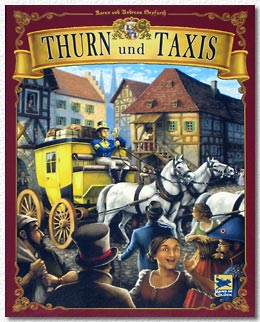
Hans im Glueck, 2004 |
Hans im Glueck always delights us with great games, and their new “Thurn und Taxis” is no exception. With 2, 3 or 4 players, the search for the best stage coach track is always fascinating. Elements of “China” and “Transamerica” fuse together to create a game of regional domination and fast connections. A game that is short but fun but also a tactical highlight is a rare thing, but here it has been accomplished. | Luding
Boardgamegeek |
|
| May 2006 | 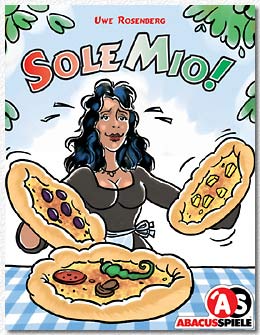
Abacus, 2004 |
This fine card game has been revived by the expansion/independent game "Sole Mio" and advanced rules. In it’s original form this was a kind of inverse Bohnanza. Players play ingredients and recipe cards on a pile, hoping that the cards below their recipe (after all card plays the tile is reversed) will be enough to fulfill the pizza recipe. Some recipes work, some don’t, and one can never be sure as remembering the actual ingredients in the pile is very difficult. The expansion adds some very odd recipes with partly complicated rules, and the possibility to “help” other players with finishing their recipe – for the price of finishing one of your own recipes for free. The odd recipes make the game more chaotic and unforeseeable, the “helping” options make the game more tactical. All in all this is a good and fun mix of ingredients, and the game was very well received in our group and has been on the table often recently. | Luding | |
| April 2006 | 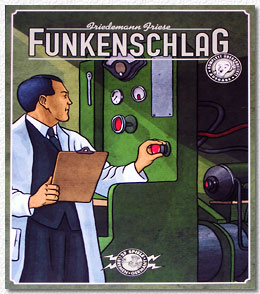
2F-Spiele, 2005 |
In German all game titles by Friedeman Friese start with the letter "f", and very often his games are really "fantastic", either through very unique themes, crazy ideas or very thoughtful game designs. "Power Grid" is an absolute "gamer's game", because it will impress the most in a round with expert gamers who explore the system to its fullest potential. All players have to keep up with the technological energy development, but very much unlike similar games like "Outpost" the last ones suddenly can become the leaders in the endgame. The winner is mostly only clear in the final round, but is not created by randomness. This is a rare design achievement, and not only because of this Friedemann Friese can proudly wear the designer crown this month. |
Luding
WPG Review Boardgamegeek |
|
| March 2006 | 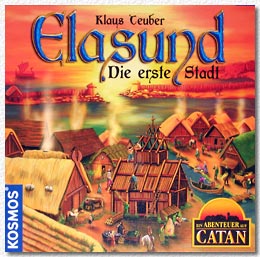
Kosmos, 2005 |
The Catan games series has literally been done to death with countless expansions, scenarios and variants readily available, some less, some more succesful. So it comes as a total surprise that quite out of nowhere this new excellent game comes along, that introduces many new elements and in fact is a very challenging and fun game in it's own right, reminiscent in some mechanics of the classic "McMulti". "Elasund" is a tense and nailbiting affair that really enriches the Catan game world without giving the feeling that they were only in it "for the money". No, it is a game with heart, from gamers for gamers, and this is greatly appreciated by us! |
Luding
Boardgamegeek |
|
| February 2006 | 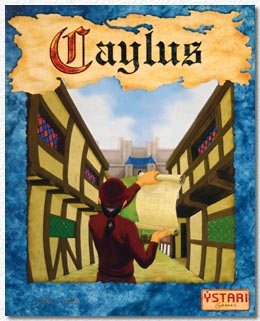
Ystari, 2005 |
At long last a game that is worth the hype. "Caylus" is a great game by the young publisher "Ystari" and it is a convincing successor to games like Puerto Rico, in which the ramifications of the many actions available to each player form a complicated whole that can be enjoyed by anyone who loves great game mechanics. "Caylus" is elegant and very streamlined, but anything but a "light" game. In fact it is very unforgiving to first time players! Still, gamers will ponder over this game for years to come, so it fully deserves our title "game of the month". |
Luding
WPG review Boardgamegeek |
|
| January 2006 | 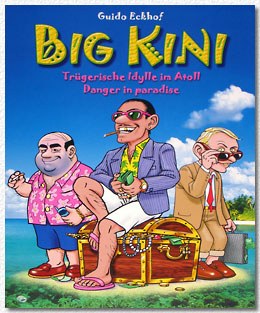
Edition PlayMe, 2005 |
The lightly handled theme creates a fun atmosphere – the island setting is artificial but somehow fresh, and the humoristic drawings are actually quite cute and funny. We like this game – it plays fast, and can be taught quickly as well. It is certainly not above Settlers in its level of complexity, and so could be a good game to introduce new gamers to the finer arts of boardgaming while giving seasoned players a lot of food for thought without them feeling undernourished… PlayMe - originally a mail-order store for games - can be congratulated on giving Guido Eckhof a chance to develop this great new game and risking to publish it in an already crowded market. It certainly has made a good splash at Essen, and we are sure it will continue so in the future. |
Luding
WPG review Boardgamegeek |
|
| December 2005 | 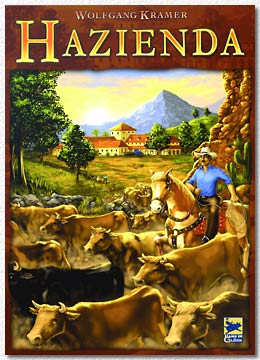
Hans im Glück, 2005 |
This is not a reinvention of the wheel, but a very solid game design by veteran Wolfgang Kramer that has players fight for control of herds, waterplaces and land. The beauty of the system lies in the many possibilities that players have each turn, and the several roads one can follow to achieve victory. Each strategy is equally worthwhile and one has to watch the game closely to see what strategy will be the most successful in a certain context. The Hans-im-Glueck edition looks beautiful and even gives the players a variant board in addition, as well as the possibility to create new boards with a software available at our website, so replayability is very high. |
Luding
WPG review Boardgamegeek |
|
| November 2005 | 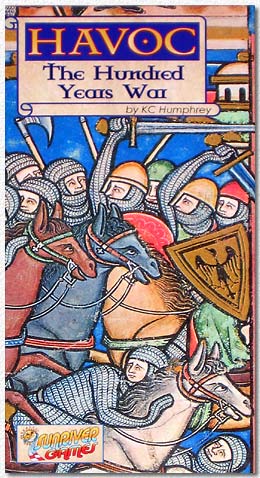
Sunriver Games, 2005 |
One of the import discoveries of Essen 2005. In our opinion this should immediately replace poker as a game, as HAVOC is much more colourful and fun. In fact knowing poker helps a lot to get into this game, but the hundred years battles add a nice flavour to it, and card management is of the essence. The card pictures are beautifully captured from original art, and the game may appeal to geeks and non gamers alike. What doth one wanteth more? A cool "starting player finding device"? Check! |
Luding
WPG review Boardgamegeek |
|
| October 2005 | 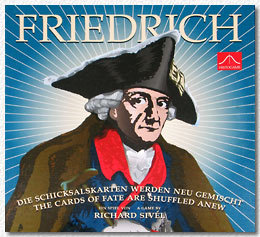
Histogame, 2004 |
Richard Stubenvoll/Sivel has created a game that is a rarity among most new designs - something that is utterly new. Friedrich is a wargame, but there are no, as often in wargames, dice, and it also doesn't last 8 or more hours. An interesting period of european history is the basis for an engrossing boardgame that uses simple playing cards as it's mechanic for battles, without ever being foreseeable or dry. The basic principles can be explained very quickly, but the game possesses immense depth. Friedrich can be recommended to anyone who is on the lookout for new gaming experiences. |
Luding
WPG review Boardgamegeek |
|
| August 2005 | 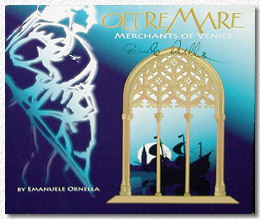
Mind the Move, 2004 |
Emanuela Ornella has created an unusual trading game, that finds room in a tiny box. In fact it's a lot of game for little money, because even though the game board and the pawns are tiny, the game immediately evokes the feeling of classical mediterranean trade. Especially interesting is the use of a special "ordered cards" mechanic, that reminds of Bohnanza, and is very difficult to master. Moving on the board is also tricky, as your ship gets isolated and deprived of bonus markers very easily. A very interesting game that demands communicative skills as well as grey matter. Recommended! |
Luding
WPG review Boardgamegeek |
|
| July 2005 | 
Phalanx, 2004 |
A wonderful offering of Kramer and Kiesling, that has many things going for it. The rules are logical and concise, and the use of the different characters and the order of victory point scoring is handled very cleverly. The visual design is simply stunning, rarely has their been a game of equally flawless designwork. And it is an interesting game full of nail-biting decisions, with even an element of travel planning thrown in for good measure. Beneath it all it is another German abstract majority-in-an-area scoring game, but it rarely gets better than this. |
Luding
Boardgamegeek |
|
| May 2005 | 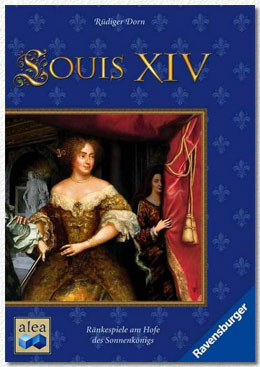
Alea, 2005 |
An excellent new offering by Ruediger Dorn, an almost perfect game of considerable decision making trees. Where should I place my influence pawns? Should I try to fulfill missions or go for the insignia? Is has the same potential for continuous replay as "Puerto Rico" with its "let's play again because I want to try something different" value. And it even uses very little physical space in your collection! But don't expect a strong theme here (although the selected nobles and their portraits show great historical research), this is a very abstract game that creates little historic atmosphere... The only slight problem is with the final additional VP's for insignia majority, which seems to jar with the perfect rest of the game (as it is pure luck of the draw, with no way to influence it), but it is possible to leave that rule away and just treat the insignia as simple VP's. |
Luding
WPG Review Boardgamegeek |
|
| April 2005 | 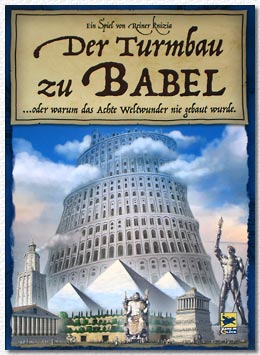
Hans im Glück, 2005 |
This month "Tower of Babel" did not win our "Game of the Month" award undisputed; didn't we build houses and auctioned for majorities in many a game so far? But "Tower of Babel" undoubtedly provides a felicitous combination of well-known game elements to form a new coherent entity. The bidding principles create new situations, new considerations and new solutions, when both the acceptance and the refusal of an offer has sufficient potential for both joy and harm on both sides of the deal. A neat idea, whose effects will take a while to fathom out. |
Luding
WPG Review Boardgamegeek |
|
| March 2005 | 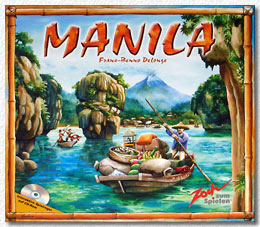
Zoch Verlag, 2005 |
After seeing nearly every place on earth transformed into a German game (Slough is still waiting for a good game bearing it's name, though) "Manila" comes along - and surprises the jaded gamer with an interesting and relaxed mixture of elements that remains fresh throughout. "Manila" is a racing game, but there are also chosen roles with special abilities and even something like shares. The relaxed aspect is the most important though, but the gamer geek gets enough interesting mechanics and options to be entertained throughout without ever feeling forced. In addition it is, as always with Zoch, a very beautiful looking game, so we applaud one of the best new games of the season. |
Luding
WPG Review Boardgamegeek |
|
| February 2005 | 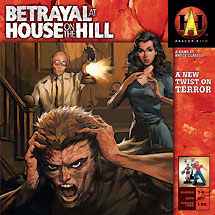
Avalon Hill Game Company, 2004 |
This game works relatively well as a traditional exploration/character advancement game, but really kicks into gear when it comes to the second part, where one player will be the evil traitor and the other players fight together to overcome one of 50 totally different evil scenarios. Some of them play like little wargames, others demand deduction and skill. Great fun for everybody involved, as the game really depicts the theme well, and the scenarios have been lovingly crafted to represent every imagineable haunted house story/cliché.The replay value is high, as the endgame is always different, but the exploration stays a bit samey. The game would profit from expansions, which could easily be integrated. Great design with wonderful atmosphere, easy to pick up, relatively short playing time - what doth the geek wanteth more? |
Luding
Boardgamegeek |
|
| January 2005 | 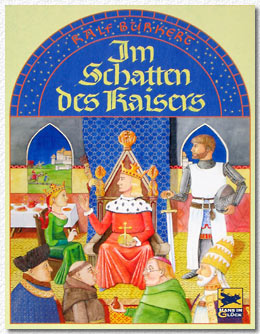
Hans im Glück, 2004 |
"Hans im Glueck" keep their high standard with "Im Schatten des Kaisers", an interesting medieval game of power and intrigue. Memories of "Kremlin" arise when one is trying to keep his important nobles from ageing and dying away. There are several opportunities to act, and especially to annoy your fellow players. Several nifty mechanics prevent the game from becoming a kingmaker fest. The actions of the players are tied to the occupation of certain spaces on the gaming board, another interesting aspect. Without doubt, this is a game that stands above the rest through its originality! |
WPG Review Luding
Boardgamegeek |
|
| December 2004 | 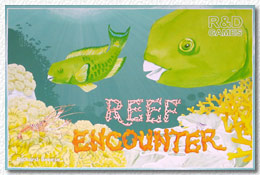
R&D Games, 2004 |
Reef Encounter, the new fascinating tile conquering game by Richard Breese, is strangely reminiscent of "Euphrates and Tigris", but interesting in it's own right. The rules and options are VERY confusing at first, so it might turn some first time players off. But it comes together in the game, which plays very tense - every action counts! Kudos also to an unusual and well handled theme, that holds together the abstract design without feeling forced on. Another winner by the prolific Breese! |
WPG Review Luding
Boardgamegeek |
|
| November 2004 | 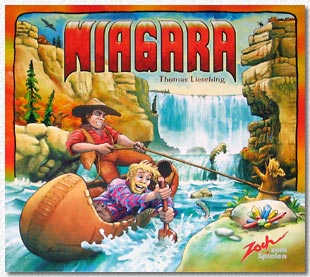
Zoch Verlag, 2004 |
The coolest things are the Petri dishes. The Petri dishes constitute the "river": Each dish is one area where players' canoes can be. At the end of each turn, the "river" advances: New dishes arrive upstream and push the old dishes (and the canoes on them) towards the fall. Due to an ingenious mechanism the dishes fall alternating from the left and the right fall. This game offers fun and some challenge for seasoned players, and it can still be explained to beginners with no trouble. Gameplay is very quick since you cannot forfeit your moving allowance. And the haptic/optic impression of Niagara is excellent. Niagara can be recommended wholeheartedly to anyone. |
WPG Review Luding
Boardgamegeek |
|
| July 2004 | 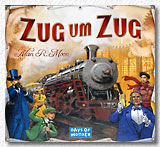
Days of Wonder, 2004 |
Our expectations were not really high when we first played this game which looks like a bigger cousin of TRANSAMERICA. But then the game quickly got us into it's grip with addictive qualities. Is it the game material, with it's beautiful plastic trains, is it the intelligent card management, is it the ongoing race with the other players, which is always in the open? This is a nervewracking game, especially when your winning route is about to be destroyed by another player. TICKET TO RIDE is a good example for a game that does not break new ground but that becames a greater whole through the sum of it's parts. |
WPG Review
Luding Boardgamegeek |
|
| June 2004 | 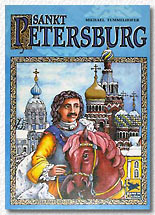
Hans im Glück, 2004 |
Following so many discussions we had about the game it didn't come as a surprise that "Sankt Petersburg" has been selected as game of the month June with large lead. Even if luck plays a considerable role it is quite a tactical game with its own fascination for mathematically oriented players. In the beginning you try to achieve the optimum payout with your selection of cards, then you discover the immense variety of cybernetics that happen on the market. Should I buy another card or better not? The effects on the next cards to be exposed cannot be predicted easily. These factors are a continuous challenge to understand the mechanisms of the game and to play it better than your competitors. |
WPG review
WPG game analysis Luding Boardgamegeek |
|
| May 2004 | 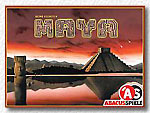
Abacus, 2003 |
The race between „Maya“ and „Goa“ was already very close last month, so it is not surprising that „Maya” easily claimed the title this month. “Maya” seems unspectacular at first glance, its mechanics seem well known, but on closer inspection the game develops its own peculiar charme, which is mostly due to its carefully balanced mechanics. Each phase is exciting – the players are always in competition for dominance while building pyramids and managing resources. Typical “German” game elements like in “El Grande” (i.e. the acquisition of “action tiles”) have been intelligently developed. The theme might be a little stale, but it would be a shame if “Maya” is overlooked because of superficially similar games like “Tikal” or “Mexica”. |
WPG Review
Luding Boardgamegeek |
|
| April 2004 | 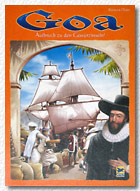
Hans im Glück, 2004 |
You might have noticed that this game has gotten a lot of talk on our website recently - Walter's excelllent strategy article actually created a run on our website! So it comes as no surprise that this game is also our "game of the month", because everybody of our group who played it liked it instantly. "Empire Building" games belong to our favourites - "Goa" uses mechanics which allow interaction (through the bidding rounds), but also leave the fate of each player in their own hands in the long run. It is certainly necessary to "have a plan" and to do the most with your limited resources. Positively received was also the fact that the game is devoid of any "kingmakering" and the usual unfair event cards a la "With this card you destroy/steal XXXX from any fellow player". Although it should be mentioned that this game will mostly be liked by gaming "geeks" (others might find it a bit dry), it will certainly satisfy anyone who likes well designed games. | Luding
Boardgamegeek |
|
| March 2004 | 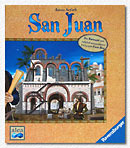
Alea, 2004 |
For some reason there are several succesful card game versions of german board games, more than the other way round. It worked with “Settlers of Catan” and even “Starfarers of Catan” (most people even argue that the card game versions are much better), why not “Puerto Rico” as well? “San Juan” is easy to pick up for all who know “Puerto Rico”, but it plays quicker and in a more relaxed way, like a card game. There is less decision as the game is somewhat dependent on card draw, but it’s easier to develop a stategy based on buildings, which sometimes can depend on the actions of the other players in the original. There are also enough new ideas and mechanisms in there to make this game an interesting one. That’s why we recommend it! | Luding
Boardgamegeek |
|
| February 2004 | 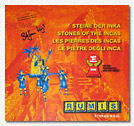
Murmel Games, 2003 |
This game reminds one of "Pueblo" at first glance, but the big difference is that the players attempt to build their 3D blocks in a way that makes them as visible as possible. "Rumis" also doesn't have an interim VP count like "Pueblo" (which in the latter game sometimes works unfairly), which speeds up the game considerably (one game should take no longer than 1/2 hour). Through the use of variable boards, each demanding a totally different strategy, Rumis develops a unique charm that elevates it from the flood of recent games. It's very simple rules make it a very good "closer" of a games evening. The game rewards clever imagination, and this is something we like! | Luding
Boardgamegeek |
|
| January 2004 | 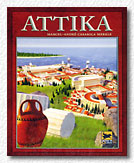
Hans im Glück, 2003 |
Our first "Game of the month" - no surprise here, this addictive tile-laying game has already found many friends internationally, although it has just recently been published. The players represent Greek city states which conquer a modular hex board. Who is the first to connect two temples? Who has built all his buildings first? To win one has to use actions most efficiently and foil the building plans of other players. The rules are simple, tactics complicated. Surely a game that will keep freaks busy for a while, because one always strives to "do it better next time". And another success for "Hans im Glueck", one of Germany's best boardgame companies. | Luding
Boardgamegeek |